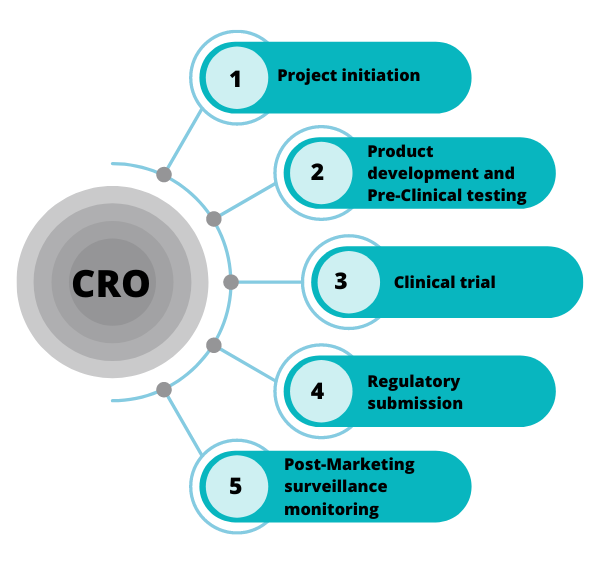
A Contract Research Organization (CRO) that provides preclinical support to pharmaceutical, biotechnology, and medical device companies provides essential services before the clinical stage of drug or device development, prior to trials involving human subjects.
This phase typically involves laboratory and animal testing to evaluate the safety, efficacy, and pharmacokinetics of a potential drug or the functionality of a medical device. The primary objectives are to gather data on safety, identify potential side effects, and determine appropriate dosages for subsequent clinical trials.
Preclinical studies are essential for establishing a scientific basis for moving forward to human trials and are required by regulatory agencies to ensure safety and minimize risks to human participants.
Preclinical CROs services include:
- In Vitro and In Vivo Studies: Conducting laboratory tests and animal studies to assess the potential therapeutic effect, pharmacological properties, and toxicological profile of a new compound or device.
- Pharmacokinetics and Pharmacodynamics Studies: Investigating the absorption, distribution, metabolism, and excretion of a drug or device, as well as its interaction with the target biological system.
- Drug Formulation and Delivery: Developing and optimizing formulations for the investigational product to enhance its stability, bioavailability, and effectiveness.
- Regulatory Support: Assisting clients with the preparation of documentation and communication with regulatory agencies to ensure compliance with guidelines and requirements.
- Data Management and Statistical Analysis: Collecting, managing, and analyzing the data generated from preclinical studies to draw accurate conclusions and support decision-making.
- Quality Assurance: Ensuring that the studies are conducted in accordance with Good Laboratory Practice (GLP) and other applicable regulatory standards.
By outsourcing these services to a preclinical CRO, pharmaceutical and biotech companies can cost-effectively and scalably leverage expertise, infrastructure, and resources they may lack, thereby accelerating the development process and potentially reducing costs.
The Stages of Preclinical Drug Development
1. Target Identification and Validation
The first step is identifying a specific molecular target (such as a protein, enzyme, or receptor) involved in a disease process and confirming its role in the development or progression of the disease. Validating the target is essential to ensure that modulating it can lead to a therapeutic effect.
2. Hit Identification and Lead Generation
Next, chemical compounds or biologic agents (hits) that can interact with the target and influence its activity are investigated. High-throughput screening techniques are often used to test large libraries of compounds. Hits are then further optimized to improve their potency, selectivity, and drug-like properties, resulting in the selection of lead compounds which show promise as a potential treatment.
3. Lead Optimization
By refining the lead compounds and modifying their chemical structure, researchers can improve their pharmacological properties, such as potency, selectivity, bioavailability, solubility, and stability — and minimize potential side effects and toxicity.
4. Preclinical Testing
Optimized lead compounds then undergo extensive in vitro and in vivo studies to evaluate their safety, efficacy, and pharmacokinetics, including:
- Absorption, distribution, metabolism, and excretion (ADME) studies to understand how the compound behaves in the body.
- Toxicology studies to assess potential short-term and long-term toxic effects on various organ systems and to determine safe dose ranges.
- Efficacy studies using animal models to evaluate the therapeutic potential of the compound in treating the target disease.
5. Regulatory Submission and Approval
Upon successful completion of preclinical studies, the data is compiled into an Investigational New Drug (IND) application or a similar regulatory submission, depending on the jurisdiction. This application is submitted to the relevant regulatory authority for review and approval. If the regulatory agency is satisfied with the safety and efficacy data, they grant permission to proceed to the clinical trial phase.
It is important to note that not all drug candidates successfully progress through preclinical stages, as many may fail due to safety concerns, lack of efficacy, or unfavorable pharmacokinetic properties. The preclinical stages are crucial for identifying and addressing potential issues before the drug candidate enters a more resource-intensive phase.
Comparing Clinical and Preclinical Research
Preclinical research uses laboratory methodologies, such as cell culture assays, molecular biology techniques, and animal testing, to investigate the pharmacological properties of a drug candidate, whereas clinical research employs randomized controlled trials, observational studies, and case reports, to investigate the drug candidate's safety and efficacy in human subjects.
From the regulatory context, preclinical research is conducted under Good Laboratory Practice (GLP) guidelines (regulations that ensure the quality, reliability, and consistency of non-clinical safety studies). By contrast, clinical research is conducted under Good Clinical Practice (GCP) guidelines, which are focused on protecting the rights, safety, and well-being of human subjects as well as ensuring the quality and integrity of the generated data.
How Preclinical CROs Safely and Efficiently Accelerate the Drug Development Process
An effective preclinical CRO offers specialized expertise, resources, and support services throughout the drug development process by bringing a wealth of knowledge and experience in various aspects of drug development that help their clients make more informed decisions, avoid common pitfalls, and overcome any challenges that may arise.
Preclinical CROs also have access to state-of-the-art facilities, equipment, and technologies that may not be readily available in-house for pharmaceutical and biotechnology companies. By outsourcing to a CRO, clients can take advantage of these resources without the need for significant upfront investment.
Finally, preclinical CROs have dedicated project management teams responsible for ensuring that projects are executed in a timely and efficient manner. This includes coordinating activities, managing timelines, monitoring progress, and ensuring that resources are allocated effectively to meet project goals.
LIDE delivers innovations in oncology translational research and immuno-oncology. Contact Global Vice President, Josh Caggiula today to learn more about our first-class research capabilities.